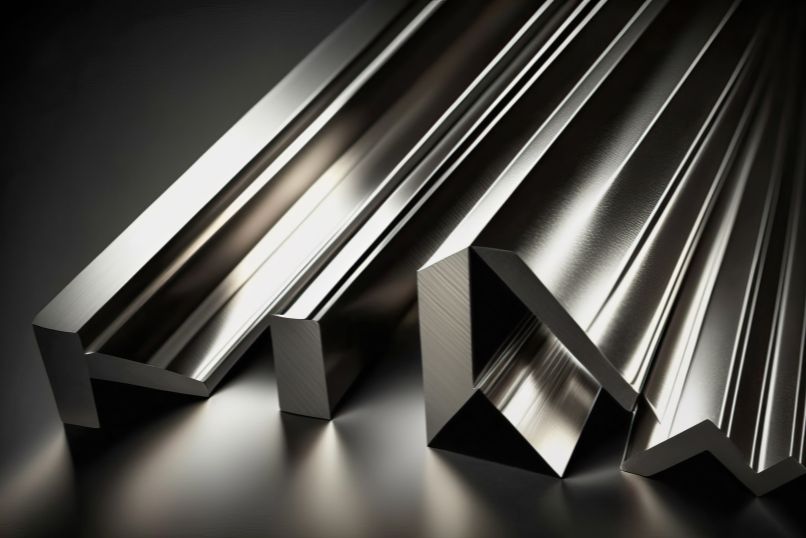Industrial blades are indispensable tools in a wide range of industries, including paper and cardboard, packaging, food processing, plastics, and metallurgy. To meet the rigorous demands of continuous and intensive use, these tools must be made of high-quality steel, ensuring they maintain sharpness, resist wear, and corrosion—essential aspects for efficiency and durability in industrial operations..
Next, we will explore the key factors to consider when choosing the type of steel for industrial blades and provide an overview of the materials commonly used in their manufacturing.
Overview of Materials for Industrial Machine Blades
When selecting the material for manufacturing industrial blades, it is crucial to understand the properties of the different types of steel available. Each type of steel offers unique advantages that make it more suitable for certain industrial applications. Below is an overview of the most common materials used in the production of industrial blades.
- Carbon Steel
Carbon steel is one of the most common materials for industrial blades. It is characterized by its high carbon content, which gives it great hardness and the ability to maintain a sharp edge. However, carbon steel can be more susceptible to corrosion, making it more suitable for applications where exposure to moisture or chemicals is limited. - Stainless Steel
Stainless steel is widely used in applications requiring high corrosion resistance, such as in the food industry or environments with high humidity. Although stainless steel may not be as hard as carbon steel, its ability to resist corrosion makes it an ideal choice for applications where durability is essential. - Tool Steel
Tool steel is a high-quality steel used in the manufacture of cutting tools, dies, and other implements requiring high hardness and wear resistance. This type of steel is known for its ability to maintain a sharp edge even in extreme working conditions, making it ideal for intensive industrial applications. - Alloy Steel
Alloy steel is a type of steel to which other elements, such as chromium, nickel, or molybdenum, are added to improve its properties. These alloys can enhance the hardness, toughness, corrosion resistance, and tempering ability of the steel, making it a versatile option for a wide range of industrial applications.
Composite Materials Used in Industrial Blades
In addition to types of steel, composite materials are also used in the manufacturing of industrial blades. These materials are not specific types of steel but offer unique characteristics that can be beneficial in particular applications:
- Tungsten Carbide
Tungsten carbide is an extremely hard and wear-resistant material, making it an excellent choice for applications requiring exceptional durability and cutting resistance. Tungsten carbide blades are ideal for cutting hard and abrasive materials. - Bimetallic
Bimetallic material combines two types of steel in one blade, allowing for the benefits of both. Typically, an outer layer of high-hardness steel is fused with a more ductile steel core. This provides a combination of surface hardness to maintain the edge and internal toughness to resist fractures and deformations.

Considerations for Choosing the Type of Steel for Industrial Blades
When selecting the right blade for a specific application, it is essential to consider the specific properties of the steel material used. Below are important factors to evaluate when choosing steel for industrial blades:
Hardness
The hardness of the steel determines the blade’s ability to maintain a sharp edge and resist wear over time. Harder steels, like high-speed steels and tungsten carbide, are preferred for high cutting speeds and intensive use. However, balancing hardness with toughness is crucial to prevent the blade from becoming too brittle.
Toughness
Toughness indicates the steel’s ability to withstand impact and shock loads. If the steel is too hard, it may become brittle and prone to chipping or breaking. Conversely, if it is too soft, it may not withstand intensive use. Finding a balance is key to ensuring durability without compromising impact resistance.
Corrosion Resistance
Depending on the application, the steel may need to resist corrosion from exposure to moisture, chemicals, or other substances. Stainless steels are often preferred for applications requiring high corrosion resistance, ensuring a longer blade life in harsh environments.
Machinability
Some steels are easier to machine and work with than others, an important factor during the manufacturing of custom blades. Machinability affects both the cost and production time, so selecting a material that balances ease of work with performance is essential.
Cost
The cost of the material is also crucial. High-performance steels can be more expensive than others. It is important to assess whether the additional benefits in performance justify the increased cost, especially in applications requiring a large number of blades or where budget constraints exist.
Relationship Between Blade Material and Material to be Cut
The material being cut often determines the specific requirements for the blade. For instance, if the material is hard and abrasive, such as stainless steel or titanium, a blade made from high-speed steel or tungsten carbide may be necessary to provide the required wear resistance and edge retention.
Conversely, if the material is softer, like plastic or rubber, a blade made from a lower hardness steel may suffice. However, it is still important to consider factors like toughness and corrosion resistance, as well as the specific requirements of the cutting process.
In general, the choice of blade material and the material to be cut are interrelated, as the properties of each will affect the performance and durability of the other. By considering both factors together, it is possible to select a blade that offers optimal performance for a specific cutting application.
Cuchillas Castillo: High Quality in Industrial Blades
As we have seen, choosing the right material for an industrial blade is a complex process that requires careful consideration of several key factors, from hardness and toughness to machinability and corrosion resistance. At Cuchillas Castillo, we understand the importance of each of these elements and specialize in creating customized solutions tailored to the specific needs of each client.
If you can’t find the recycling or handling blade you’re looking for, Cuchillas Castillo can manufacture any type of industrial blade according to your plans or requirements. We take pride in delivering high-quality products that ensure optimal performance in the most demanding applications.
Feel free to contact us at +34 961 255 380 or info@cuchillascastillo.com if you have any questions about our products or services. We are here to help you find the perfect solution for your industry.

